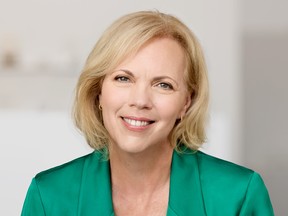“I think there’s lots of issues that can be debated on the value going forward of a public broadcaster,’ Marie Philippe-Bouchard told Parliamentarians this week

OTTAWA — When Marie Philippe-Bouchard was first approached to throw her name into the running to become the next president of CBC/Radio-Canada, she declined.
The Quebec television executive, who spent 29 years at the CBC before leaving to become CEO of TV5 back in 2016, said she instead volunteered to sit on the committee tasked with providing Canadian Heritage Minister Pascale St-Onge advice on developing a new mandate for the nearly 90-year-old public broadcaster.
“I thought, ‘OK, that’s going to be my contribution.’”
Philippe-Bouchard eventually changed her mind and will officially begin as the new head of CBC/Radio-Canada in January.
But no one around the table at the parliamentary committee where she testified earlier this week would have blamed her had she not reconsidered.
As Prime Minister Justin Trudeau huddled with premiers in a virtual meeting to discuss U.S. President-elect Donald Trump and his threat of tariffs, Philippe-Bouchard spent Wednesday evening being grilled about her plans to tackle the mounting challenges facing the broadcaster.
Summoned by Opposition parties demanding to know her plans for its future — including the very real possibility of losing funding under a future Conservative government — Philippe-Bouchard’s responses suggest she is at the very least prepared to usher in a change in tone
“I understand that that debate occurs in Canada,” she said. “And I think it’s a healthy debate.
“I think there’s lots of issues that can be debated on the value going forward of a public broadcaster,” she said, adding that was all she could say about the matter for now.
“I’m sure that’ll change in about 40 days,” Kurek quipped.
Philippe-Bouchard’s response marks a shift from the warnings Tait has spent her final weeks delivering about the perils of slashing the CBC’s $1.4 billion in annual funding, which Conservative Leader Pierre Poilievre has vowed to do.

The animosity between Tait and the Conservatives was on full display when house leader Andrew Scheer thanked Tait for helping promote the party’s push to cut its funding, telling Tait that she has “been the most successful person in creating the demand to defund the CBC,” outside of the party’s own caucus.
Philippe-Bouchard did, however, list compensation as one of her first priorities when she assumes the five-year post on Jan. 3.
“I’m going to be working on making sure that we have a system that’s transparent and that people can trust in our administration and management of public funds, especially in the context of compensation,” she said.
She also poured water on expectations that Tait may receive an “exit package” when she finishes her term, which is something Conservatives have asked the outgoing CEO. Philippe-Bouchard said she would have no sway over the decision.
“It’s very interesting,” Kurek said, “because previously, when we’ve asked that question, there has been a refusal to even talk about what that may or may not look like.”
Rebuilding the corporation’s local news services will be another focus, according to Philippe-Bouchard, which has been another longstanding criticism of the broadcaster.
“My objective is not to have CBC as the sole voice.
“It’s important to have diversity of voices and different sources of news. So we have to figure out not only a way to rebuild in our regional services, but also to support other regional and local broadcasters and media.”

Ensuring Canadians trust the CBC has to be done through earning it, she later added. “You never take it for granted.”
When it comes to paying out bonuses or, as the corporation has explained it, “performance pay” that is built into employee contracts, Philippe-Bouchard said she first needs to see the outcome of a third-party review, which she expects in early 2025.
“Because it’s one thing to say you’re going to ban something,” she said in reply to a question from Conservative MP Jamil Jivani.
“How do you go forward? What do you do with the employees that have their contracts? What do you do in terms of fair compensation? So I need a plan in order to commit to something.”
“I’m not tone deaf,” she later added.
As for the question of potential job cuts, either as a result of the corporation’s own budgeting or the disappearance of funding as threatened by the Tories, Philippe-Bouchard said she couldn’t speak to what CBC/Radio-Canada’s workforce may look like.
Much of parliamentarians’ criticism of the corporation paying out millions in bonuses came after it announced a budget short fall last year that resulted in 141 job cuts and eliminating 205 vacancies.
“I’m quite aware of how hard it is to balance a budget and how wrenching it is to actually announce to people that they won’t have a job,” Philippe-Bouchard said.
“I’ve done that. I’ve had to do that, and I don’t look forward to having to do that again. If I could avoid that altogether for the rest of my life, I would be the first to sign in.”
National Post
Our website is the place for the latest breaking news, exclusive scoops, longreads and provocative commentary. Please bookmark nationalpost.com and sign up for our politics newsletter, First Reading, here.